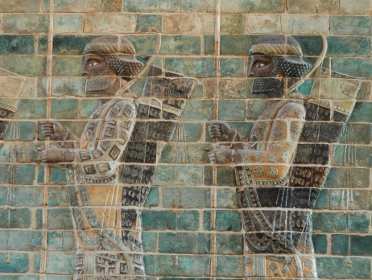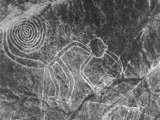Persian Empire

Establishment of the Persian Empire
The Persians are believed to migrate from the Caucasus to the territory of the modern Iran at the beginning of the 1st millennium BC where they established their own state in the 7th century BC. The foundation of the Persian state is traditionally attributed to Achaemenes from whom all Persians rulers claimed to descent. The Persian Empire is therefore often also referred to as Achaemenid Empire.
Expansion of the Persian Empire under Cyrus the Great and Cambyses II
The Persian Empire arose in its greatness under Cyrus the Great (r. ca. 559-529 BC) who captured Media, Elam, Lydia and Babylonia. How far he extended the Persian territory eastwards is not exactly known but some historians believe he could have reached even the Peshawar region. Cyrus the Great is also famous for ending the Babylonian captivity by allowing the Jews to return to Jerusalem and rebuilt the Temple. His successor Cambyses II (r. 529-522 BC) further extended the Persian Empire by conquering Egypt. He died during his return to Persia and was succeeded by Darius the Great (r. 522-486 BC).
Persian Empire during the Reign of Darius the Great
The Persian Empire reached its golden age during the reign of Darius the Great, the king of kings who extended the Persian borders to the Indus River on the east and Egypt, Aegean Sea and lower Danube on the west. He centralized administration by dividing the Persian Empire into 20 satrapies governed by satraps. Each satrap was checked by a secretary and a military commander responsible directly to the king. Darius the Great also pursued his predecessors’ tolerance to the peoples in the conquered lands allowing them to worship their own gods and follow their own customs. He even funded the rebuilding of the Temple of Jerusalem. Despite that Darius the Great had to deal with several rebellions, while the uprising of the Ionian cities in Asia Minor brought him into conflict with the Greek city-states. He launched an expedition to punish the Greek city-states for aiding the insurrection of the Ionian cities starting the Persian Wars but he was defeated by the Greeks in the Battle of Marathon in 490 BC.
Persian Defeat against the Greek City-States
Darius the Great died before he was able to launch a new campaign against the Greek city-states. His successor Xerxes I (r. 486-464 BC) continued the war against the Greek city-states but the Persian fleet was heavily defeated at the Battle of Salamis in 480 BC, while Xerxes’ general Mardonius was decisively defeated at the Battle of Plataea in 479 BC. Following the defeat against the Greek city-states the power of the Persian Empire gradually started to decline.




